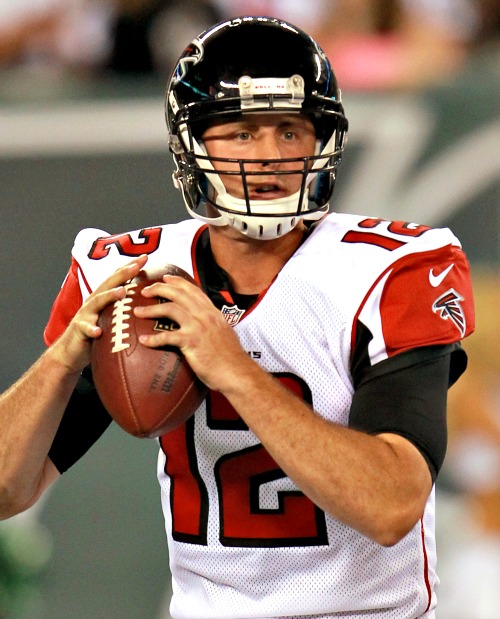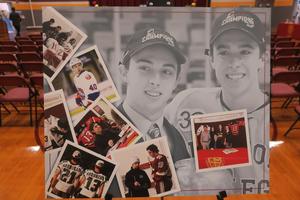Atlanta Falcons’ QB ‘Catholic for a Reason’
The Church shapes third-year pro Sean Renfree’s vision.

After undergoing losing seasons in 2013 and 2014, the Atlanta Falcons have a renewed focus and energy. If the season ended today, the team’s 6-3 record would earn them a wild-card berth in the NFL playoffs.
Backup quarterback Sean Renfree is hopeful the Falcons’ success will continue and is relying, in part, on the team’s camaraderie to make that happen. Solidarity in sports is nothing new to the 2013 seventh-round draft pick, who has had Catholic teammates and coaches since his high-school days in Phoenix.
Even before entering high school, Renfree’s Catholic sporting formation had a good start with his father, Dr. Kevin Renfree, an orthopedic surgeon at the Mayo Clinic’s Phoenix campus. Dr. Renfree played football at the University of Notre Dame from 1979-1980 and delighted in using his college experience to teach his eldest how to play the game.
Sean Renfree, a three-time Academic All-Atlantic Coast Conference honoree at Duke University from 2010-2012, spoke with Register correspondent Trent Beattie about the Falcons’ season and how the Catholic Church teaches us to treat each other.
After going 4-12 in 2013 and 6-10 last year, the Falcons are 6-3 so far this year and are likely to be in the playoffs. What has been the biggest difference between this season and the previous two?
The biggest change is that we seem more energized this year. This vitality comes from our new head coach, Dan Quinn, who has an upbeat style. He is very enthusiastic, and while he sets the tone for the coaching staff and the team, he’s not domineering. He’s genuinely personable and comes across as one of the guys.
Having good camaraderie can take you a long way in the NFL. At this level, there’s very little difference in the skill levels of teams, so preparing and executing well as a team can be the decisive factor. I think this factor — our cohesion — is one of our strengths.
Of all the sports to play, what was it about football that caught your attention?
I played basketball and baseball in grade school and high school, but football was my favorite sport. It is the camaraderie that I enjoy most. Other sports are team-oriented, as well, but in football, it becomes more magnified. There are more players and coaches, a greater need for everyone on the team to play well, more serious physical risks involved and more attention from fans.
In basketball and baseball, you can have a shooter or pitcher dominate a game pretty much on their own, but in football, that’s not possible. You need to have all the guys around you play well in order for you to do your job. As a quarterback, if you don’t have a strong offensive line or capable receivers, you aren’t going to be very effective. You rely heavily on your teammates.
Do you think those aspects of a large community facing challenges are analogous to what is found in the Catholic Church?
There are definitely some similarities. The Church is a very large community, whose members share each other’s burdens and lean on one another for support. Life poses a lot of challenges, so we can’t be expected to deal with them on our own. That’s where the Church comes in. We’re all supposed to operate as a cohesive unit — as one body. Each part of the body has a different function that contributes to its overall good.
I really like how we’re all on the same page in the Church, despite differences in language and customs. The Mass readings are the same in Atlanta as they are in London. There are many variations across cultures, but the most essential aspects of life are the same for Catholics. We have an organized leadership and worship the same Lord in basically the same way, no matter where we might live.
I’ve been asked by some people to attend their non-Catholic worship services. I thank them, but decline, and tell them that I’m Catholic for a reason. There’s something special about the Catholic Church that you can’t find anywhere else — the Eucharist. The sacramental presence of Jesus is what unifies us and gives power and meaning to every other good found in the Church.
Jesus’ presence in the Eucharist makes it easy to pray in church, but do you find it tough to pray in and around games, practices and other activities associated with pro football?
Football can be hectic and definitely keeps me busy, but I’ve still found it easy to keep praying at the beginning and end of the day — and also at various times in between. Short prayers throughout the day go a long way, as far as keeping me focused on what matters. The right focus, or intention, is what Matthew 6:22 is about, and we can only get that intention, and the resolve to follow through on it, by praying. The reason for this is that prayer connects our minds and hearts with God.
Short prayers are incredibly helpful, but sometimes there are challenges that require longer periods of prayer, so it can be crucial to step away and do some more in-depth communication with God and the saints. The Rosary has been a great tool to help guide me through obstacles, and my grandfather carries a rosary with him for this same reason. He calls it his “toolbox,” which is fitting, because Our Lady of the Rosary has a way of making things right.
If you weren’t playing football, what would you be doing?
I’m not completely sure, but I’ve given a lot of thought about going to medical school or doing something else health care-related. My father is a doctor, so I’ve seen up close what medicine is about. It’s based on compassion for one’s fellow man and a desire to improve his condition.
At Duke, I would do regular hospital visits with my teammate Jeffrey Faris. We mostly visited kids and tried to make their stays a little more bearable. One of the most memorable patients was a boy recovering from an auto-immune disease that had left him paralyzed. At first he couldn’t move at all, and, gradually, he became more mobile and got to leave the hospital after a couple months. I had great compassion for him because I thought of how tough being confined to a bed for so long like that would be.
My mother is a nurse and has always been big on service, so she has encouraged me and my brothers to do the same. Participating in Meals on Wheels and volunteering in various ways are some of the things she likes to do. She’s aware of how blessed we are, so she wants to share those blessings with others less fortunate.
I greatly admire Mother Teresa, who took volunteering to levels the rest of us can only admire. She didn’t have personal belongings and served the poorest of the poor in the most-dire situations. These extraordinary actions were only after first giving herself completely to Jesus, because nothing she did was merely social; it was all spiritual. She helped many people in material ways, but this was because she saw a dignity — namely, the image and likeness of God — in each of those people.
I greatly enjoyed a book [about Mother Teresa], which has this saying: “The fruit of silence is prayer. The fruit of prayer is faith. The fruit of faith is love. The fruit of love is service. The fruit of service is peace.” Serving our fellow man brings peace, but there’s a chain before that which is spiritual.
Do you think there’s a spiritual component that needs to be brought to sports in order for them to be satisfying?
I think so. My dad played two years as a walk-on at Notre Dame under Dan Devine. Anyone who has been to Notre Dame knows that spirituality is a central part of the campus, and this has been true with their sports teams, too. My dad brought that background with him when he taught me how to play sports, which was a great start for a kid.
Something else that has made the football-faith connection strong for me is going to Notre Dame Prep, a Catholic high school in Arizona. Team prayers and Masses were a mainstay. Then, at Duke, I was fortunate to have a Catholic head coach, David Cutcliffe, who made sure Mass was available to Catholic players. Now I’m in the same situation here in Atlanta, since our head coach is Dan Quinn.
Being around other Catholic players and coaches is a gift I’ve been blessed with. The character of the guys around you makes a huge difference, and I’ve been fortunate to have been around some great people. After a season, or after you’ve left a school or team, what stays with you is the relationships you’ve formed with other guys you’ve worked so closely with, through all the challenges of the game. It’s the community aspect of sports that is powerful, and a sense of community comes to perfection in the Church.
Register correspondent Trent Beattie writes from Seattle.

















